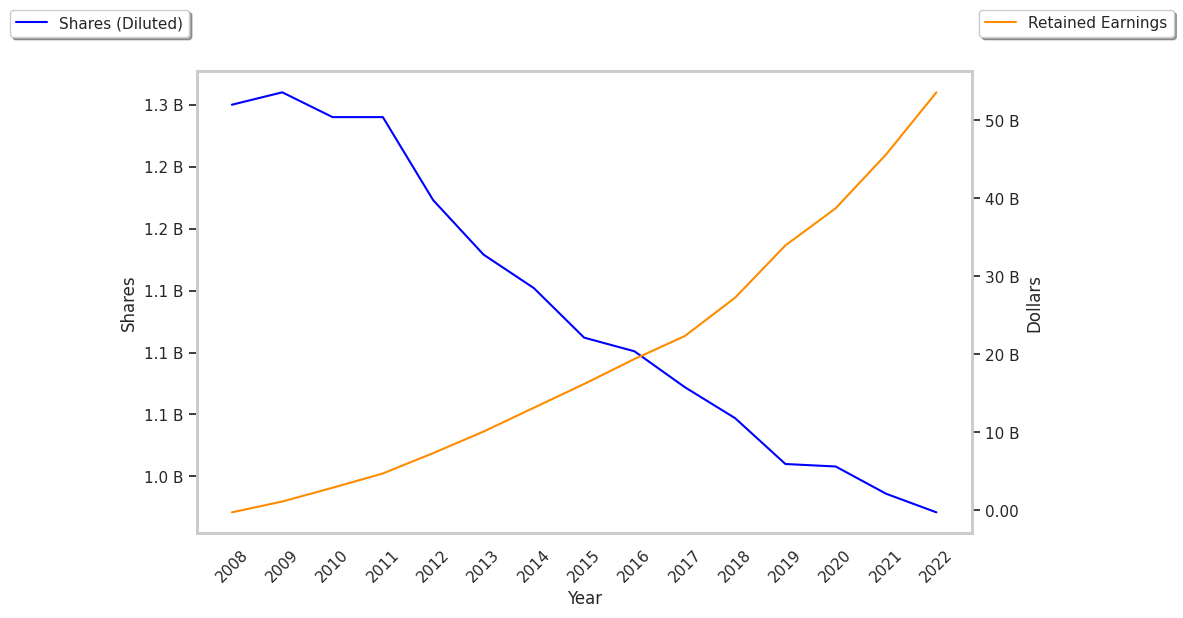Now trading at a price of $431.24, Mastercard has moved -3.0% so far today.
Mastercard returned gains of 11.0% last year, with its stock price reaching a high of $490.0 and a low of $359.77. Over the same period, the stock underperformed the S&P 500 index by -13.7%. The company's 50-day average price was $450.0. Mastercard Incorporated, a technology company, provides transaction processing and other payment-related products and services in the United States and internationally. Based in Purchase, NY, the Large-Cap Consumer Discretionary company has 33,400 full time employees. Mastercard has offered a 0.6% dividend yield over the last 12 months.
Generally Positive Cash Flows but an Average Current Ratio:
| 2018 | 2019 | 2020 | 2021 | 2022 | 2023 | |
|---|---|---|---|---|---|---|
| Revenue (M) | $14,950 | $16,883 | $15,301 | $18,884 | $22,237 | $25,098 |
| Operating Margins | 49% | 56% | 53% | 53% | 55% | 56% |
| Net Margins | 39% | 48% | 42% | 46% | 45% | 45% |
| Net Income (M) | $5,859 | $8,118 | $6,411 | $8,687 | $9,930 | $11,195 |
| Net Interest Expense (M) | $186 | $224 | $380 | $431 | $471 | $575 |
| Depreciation & Amort. (M) | $459 | $522 | $580 | $726 | $750 | $799 |
| Diluted Shares (M) | 1,038 | 1,013 | 1,006 | 992 | 971 | 946 |
| Earnings Per Share | $5.6 | $7.94 | $6.37 | $8.76 | $10.22 | $11.83 |
| EPS Growth | n/a | 41.79% | -19.77% | 37.52% | 16.67% | 15.75% |
| Avg. Price | $186.39 | $250.56 | $304.19 | $353.21 | $347.79 | $429.26 |
| P/E Ratio | 33.11 | 31.4 | 47.53 | 40.18 | 33.9 | 36.19 |
| Free Cash Flow (M) | $5,893 | $7,761 | $6,885 | $9,056 | $10,753 | $11,609 |
| CAPEX (M) | $330 | $422 | $339 | $407 | $442 | $371 |
| EV / EBITDA | 25.27 | 25.39 | 35.6 | 33.06 | 26.66 | 28.11 |
| Total Debt (M) | $6,334 | $8,527 | $12,672 | $13,901 | $14,023 | $15,681 |
| Net Debt / EBITDA | -0.04 | 0.15 | 0.3 | 0.6 | 0.54 | 0.48 |
| Current Ratio | 1.39 | 1.42 | 1.61 | 1.29 | 1.17 | 1.17 |
Mastercard benefits from strong operating margins with a stable trend, generally positive cash flows, and growing revenues and a flat capital expenditure trend. The company's financial statements show a strong EPS growth trend and healthy leverage levels. Furthermore, Mastercard has just enough current assets to cover current liabilities, as shown by its current ratio of 1.17.
The Market May Be Overvaluing Mastercard's Earnings and Assets:
Mastercard has a trailing twelve month P/E ratio of 35.7, compared to an average of 22.06 for the Consumer Discretionary sector. Based on its EPS guidance of $15.35, the company has a forward P/E ratio of 29.3. Mastercard's PEG ratio is 3.0 on the basis of the 11.9% weighted average of the company and the broader market's EPS compound average growth rates. This suggests that the company's shares are overvalued. Furthermore, Mastercard is likely overvalued compared to the book value of its equity, since its P/B ratio of 55.43 is higher than the sector average of 3.18. The company's shares are currently trading 876.8% below their Graham number. Overall, Mastercard's lofty valuation in terms of earnings and assets is to some extent attenuated by its strong cash flow trend and reasonable levels of debt.
Analysts Give Mastercard an Average Rating of Buy:
The 38 analysts following Mastercard have set target prices ranging from $391.65 to $567.82 per share, for an average of $472.21 with a buy rating. The company is trading -8.7% away from its average target price, indicating that there is an analyst consensus of some upside potential.
Mastercard has a very low short interest because 0.5% of the company's shares are sold short. Institutions own 79.0% of the company's shares, and the insider ownership rate stands at 10.61%, suggesting a large amount of insider shareholders. The largest shareholder is Vanguard Group Inc, whose 8% stake in the company is worth $32,595,104,753.



